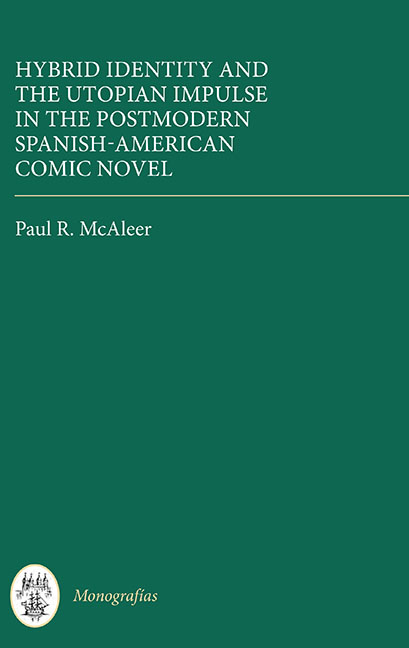Book contents
- Frontmatter
- Contents
- Acknowledgements
- 1 Contextualising the Debate: The European Comic Tradition and the Question of Context
- 2 Gustavo Sainz’s La princesa del Palacio de Hierro: Comedy and the Female Character in Transnational Mexico
- 3 Comic Identity and Cultural Exile in Bryce Echenique’s La vida exagerada de Martín Romaña
- 4 Black Comedy and Identity Loss in Fernando Vallejo’s La virgen de los sicarios: On the Road to Dystopia
- 5 Jaime Bayly’s La noche es virgen: Comic Queer Identities in the Era of Transnationalism
- Utopia, Comedy and Latin American Utopianism: Is This Really the End?
- Bibliography
- Index
5 - Jaime Bayly’s La noche es virgen: Comic Queer Identities in the Era of Transnationalism
Published online by Cambridge University Press: 07 May 2022
- Frontmatter
- Contents
- Acknowledgements
- 1 Contextualising the Debate: The European Comic Tradition and the Question of Context
- 2 Gustavo Sainz’s La princesa del Palacio de Hierro: Comedy and the Female Character in Transnational Mexico
- 3 Comic Identity and Cultural Exile in Bryce Echenique’s La vida exagerada de Martín Romaña
- 4 Black Comedy and Identity Loss in Fernando Vallejo’s La virgen de los sicarios: On the Road to Dystopia
- 5 Jaime Bayly’s La noche es virgen: Comic Queer Identities in the Era of Transnationalism
- Utopia, Comedy and Latin American Utopianism: Is This Really the End?
- Bibliography
- Index
Summary
Our fifth and final novel, Jaime Bayly's La noche es virgen (1997), heralds a return of focus to the ‘novel proper’ and the comic play/Bildungsroman/picaresque formula that, it has been argued, acts as an archetypal template for all the texts studied thus far. The story of Gabriel Barrios, a twentysomething TV presenter whose utopian desire takes the form of appropriating a satisfactory gay identity in the machista Peruvian society of the mid-1980s, which leads him on a journey through the underbelly and drug culture of Lima and into an ephemeral relationship with Mariano, a young wannabe rock singer, bears many of the hallmarks of the tradition. First, Bayly's novel is very much concerned with the themes of identity and society in which the utopian impulse of comedy is firmly encoded: Gabriel's quest for a satisfactory gay identity and the conflict of this desire with his social position as a wellknown TV presenter and white upper-class male. Secondly, the narrative structure follows the now familiar pattern of a first-person narrator/protagonist dichotomy that frames the process of individual identity acquisition: Gabriel, looking back into the past, narrates the novel's events from a mature and nostalgic perspective and from the relatively comfortable milieu of Miami. Thirdly, La noche's principal features – its irreverent and comic tone, the role of satire, the use of the engaño/desengaño formula, the top-to-bottom depiction of Peruvian society, the itinerant and dynamic movement of the narrator, and the foregrounding of a ‘realistic’ and regional, oral style of narration – identify the novel with the picaresque tradition as well as with some of the classic components of comic literature in general.
Again, as with the previous novels studied, it is not a question of an untrammelled inscription, but of an encoding process that moulds and reshapes the comic form to the extent that its manifestation and functions, while still recognisable, operate in a markedly different way. In La noche, the comic Bildungsroman structure that classically entails a linear birth-to-marriage narrative, a rise in social status and process of identity formation is used to construct a different composition.
- Type
- Chapter
- Information
- Hybrid Identity and the Utopian Impulse in the Postmodern Spanish-American Comic Novel , pp. 123 - 146Publisher: Boydell & BrewerPrint publication year: 2015



